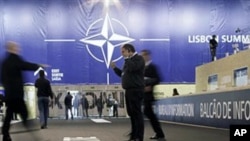The 28-member nations of the North Atlantic Treaty Organization are scheduled to meet on Friday and Saturday in Lisbon to discuss updating the alliance's mission and the future of its military effort in Afghanistan. NATO is expected to put new emphasis on gradually handing control of Afghanistan's security to the Afghan people.
As NATO members such as Canada and the Netherlands end their combat roles in Afghanistan, the allies still taking part in the fighting are changing their missions.
One of U.S. President Barack Obama's top advisors on Afghanistan, Douglas Lute, said this week that the alliance will announce a longer-term transition that will eventually put Afghans in charge of their country's security.
"This process across the 34 provinces will aim to be completed by the end of 2014. So it is a process that begins in early 2011 with the target of completion at the end of 2014," said Lute.
The new plan will call for NATO forces to continue training and humanitarian work in Afghanistan beyond 2014.
Afghanistan President Hamid Karzai will attend Saturday's meeting on the alliance's mission in his country. In a recent interview with The Washington Post newspaper, Mr. Karzai demanded that NATO reduce its military operations in Afghanistan and end the successful joint night raids with Afghan troops against Taliban forces.
President Obama is expected to meet with Russian President Dmitry Medvedev as some Republicans in the U.S. Senate balk at ratifying the New START strategic arms reduction treaty.
Some key senators say the treaty will almost certainly not be passed this year. Mr. Obama says ratifying the accord is a national security imperative and a cornerstone in U.S.-Russia relations.
"The stakes for American national security are clear and they are high. The New START treaty responsibly reduces the number of nuclear weapons and launchers that the United States and Russia deploy, while fully maintaining America's nuclear deterrent," said the president.
Efforts to improve NATO's relationship with Russia are expected to be another of the summit's main priorities.
NATO leaders will also work on a new strategic concept for the alliance, replacing one adopted in 1999. The new assessment of NATO's mission is expected to include stronger defenses against cyber terrorism and against ballistic missiles.
The president is scheduled to conclude his visit to Lisbon by meeting briefly with leaders of the European Union. The United States is expected to emphasize continued cooperation with Europe on economic and security issues.
NATO Lisbon Summit to Discuss New Afghan Plan




